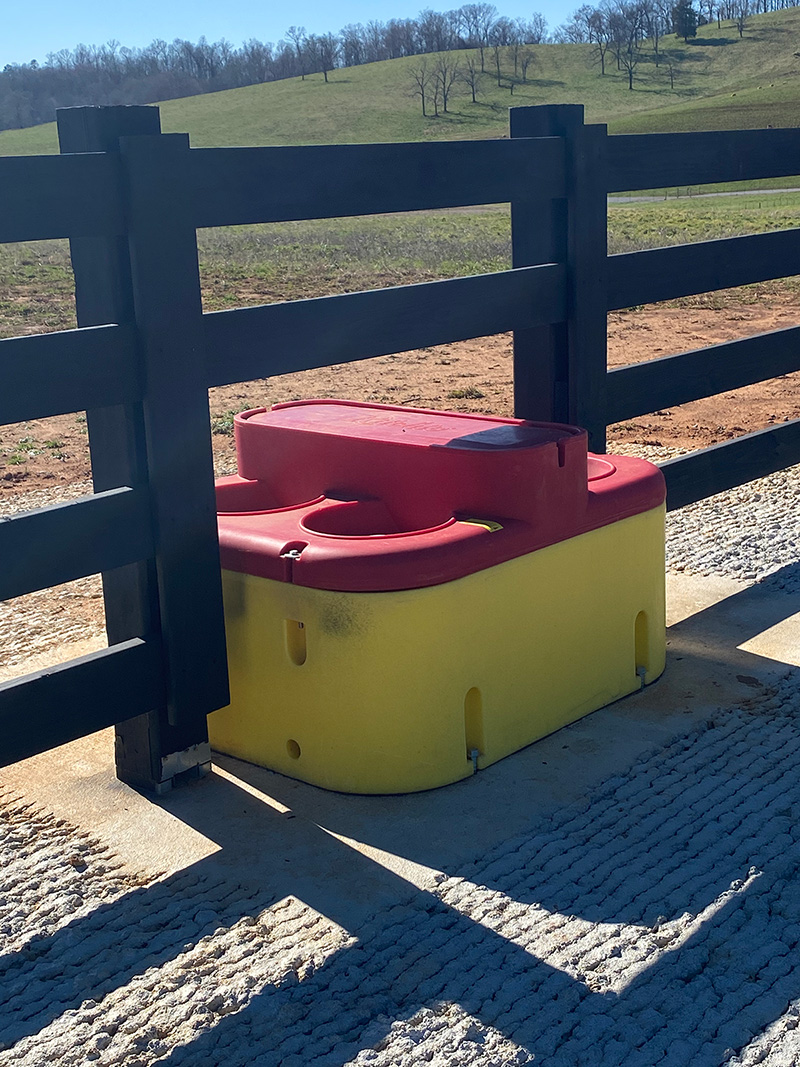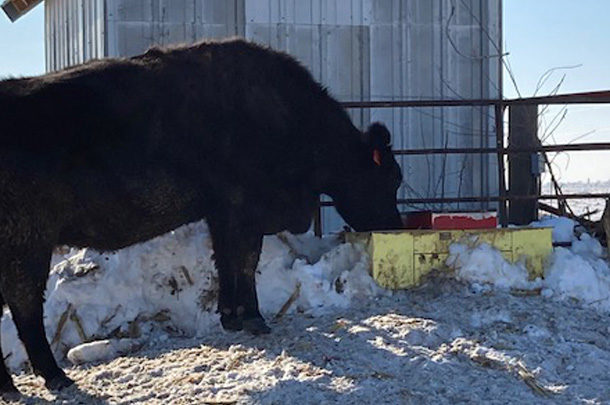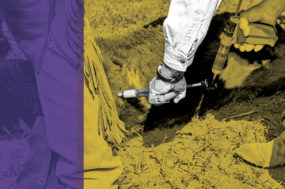When it comes to tackling environmental issues in the cattle industry, Dave Petty of Iowa River Ranch near Eldora, Iowa, has always been one to grab the bull by the horns. Petty and his wife, Diane, are first generation farmers who founded their own ranch in 1987. Primarily a cow-calf operation with a finishing feedlot, the Iowa River Ranch is a diversified farm encompassing cropland, pasture and hay land. Petty has demonstrated a lifetime commitment to being a good steward to the land and the environment while producing quality Angus cattle.
This commitment has been recognized by many agricultural and environmental groups throughout the years. Here are a few of the highlights:
- NCBA's National Award for Environmental Stewardship in 2000
- Environmental Protection Agency's Administrators Environmental Excellence Award in 2002
- 2003 Spencer Award for Sustainable Agriculture
- 2005, the Master Farmer Award from Wallace's Farmer
- 2013 Iowa Cattlemen’s Association Hall of Fame Inductee
When asked about his environmental stewardship, Petty revealed that he always asks himself three main questions when making management decisions for the ranch.
- Will this be economically feasible and sustainable?
- Will this be good for the environment?
- Will this be socially acceptable and supported by the local community?
“Every step in our operation we are trying to add value in each process, said Petty. “Our ranch borders the Iowa River for a few miles, and that is an underlying reason why we are very aware of how our ranch can impact the local environment. When it comes to environmental practices, we strive to be part of the solution, not part of the problem.”
Water Productivity on Iowa River Ranch
Maximizing the efficiency of all the resources needed to produce quality beef sustainably has led the Iowa River Ranch to scrutinize every facet of production from genetics to water resource management and productivity.
“One of the things that I’ve really noticed over the years is that to be profitable in grazing, you need to have water distributed properly across your operation,” said Petty. “if you are over or under grazing, you just aren’t as efficient as you could be. It becomes important to use a good, reliable water system that can withstand the severe winter weather of the Midwest and work well in the summer months too.”
Petty’s early experiences helped shape his understanding on how providing water in the right place can affect your productivity and profitability.
“When I bought the place, the cattle used to walk two miles to water to get a drink,” said Petty. “So, the first quarter mile was ruined by heavy grazing and they never got to the far quarter mile. They would get their drink, get hungry and start walking back the other way, and all it did was wear their weight off going back and forth to get water. I researched and drilled several wells and installed miles of underground black plastic pipe running to different waterers strategically placed in the grazing paddocks and all of sudden, I’ve got full utilization of all my acres. I can rotate my grazing livestock, increase the health and diversity of the pastureland, which in turn gives you more forage to put pounds on a healthy animal which makes you more profitable. The critical part of the whole set-up is the watering system, and on my farm the products that have been well worth the money are our Ritchie waterers.”
 Courtesy photo.
Courtesy photo.
Invest in Quality Watering Systems for Maximum Returns
According to the Daugherty Water for Food Global Institute at the University of Nebraska, a better measure to compare water efficiencies within the livestock production system is the term water productivity. This is the production yield divided by how much water went into producing it, essentially the inverse ratio of a water footprint that places value on the end product. The Institute recently released a Water Productivity Report that included research that showed beef production in the United States from 1960 to 2016 increased its water productivity by 1.8 times.
Proper water management, conservation practices, better genetics, increased yields of feedstuffs and more efficient feed conversion ratios have all contributed to this increased water productivity. On Iowa River Ranch, all these factors have contributed to a highly efficient, sustainable and environmentally conscious operation.
“Providing clean, fresh water on demand helps increase feed consumption, which raises your daily rate of gain, which in turn makes you more profitable at the end of the day,” said Petty. “Ritchie waterers have been a part of our total management system that has allowed me to double my production. You need to use high quality products that have longevity. We are all busy, so we can’t be dallying around with equipment that doesn’t work and isn’t reliable. I got advice from an older farmer who told me ‘you’ll never live long enough to make all the mistakes yourself, so if you can learn from other people, do it’. Through researching waterers during facility planning, I learned that Ritchie set the standard for quality and customer service – every other product out there would compare themselves to Ritchie and I thought to myself, why not just start out with an automatic waterer that has a proven record of dependable service? It goes back to my three basic questions – economically feasible? Ritchie waterers may cost more upfront, but they save money over the long term because they are reliable and just continue to keep working. In fact, I have used one unit now for over 30 years. On the day of the storm or the coldest weather you need your waterer to come through for you, and those red and yellow Ritchies always come through for us. Is it good for the environment? Ritchie waterers reduce water waste while providing fresh water to keep the cattle healthy. Is it socially acceptable? Ritchie Industries is a company that takes care of its customers, its employees and the Conrad, Iowa community where they are built. Ritchie has been in business 100 years this year, and you only do that if your product is made to last and meets the needs of your customers.”
Leaving a Legacy for Generations to Come
Dave Petty and his wife, Diane, continue to be thoughtful stewards of their land and are continuously seeking new knowledge to improve their operation. Iowa River Ranch frequently hosts visitors and gives tours to showcase sustainable, environmentally sound agricultural practices. Petty has taken on countless leadership roles in the cattle industry and has been active in engaging EPA regulators to promote agriculture as a solution to environmental concerns.
While Petty is proud of his accomplishments, he is a humble farmer who never set out to win awards. He just set out to do what is right – for the cattle, for the land, for his family and for the community. When Petty was inducted into the Iowa Cattlemen’s Association Hall of Fame, fellow Iowa cattle producer, Bill Couser, remarked that “Dave Petty has gone the extra mile to get common-sense legislation passed, helping to educate those who regulate our industry. The beef industry is better off today for his involvement. Every cattle operation in Iowa is better off because Dave Petty took time to make it so.''
For more information about livestock watering systems visit Ritchie Industries.
For more information about water productivity visit Daugherty Water for Food Global Institute at the University of Nebraska.
Ritchie Industries was founded in 1921 by Thomas Ritchie, an Oskaloosa, Iowa farmer. Ritchie patented the first automatic waterer valve and developed the first automatic livestock watering systems. Celebrating 100 years of always being made in America, Ritchie is headquartered in Conrad, Iowa. This employee-owned business designs, engineers and manufactures over 40 models of waterers to meet the needs of livestock producers and horse owners. Over 3 million Ritchie units have been sold worldwide. Visit RitchieFount.com for more information.





